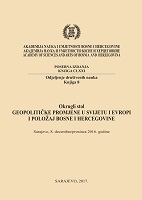BOSNA I HERCEGOVINA I GEOPOLITIČKE PROMJENE U EVROPI I SVIJETU NA POČETKU XXI STOLJEĆA
BOSNIA AND HERZEGOVINA AND GEOPOLITICAL CHANGES IN EUROPE AND THE WORLD IN THE BEGINNING OF 21ST CENTURY
Author(s): Mirko Pejanović
Subject(s): Politics, Political history, Transformation Period (1990 - 2010), EU-Approach / EU-Accession / EU-Development, Geopolitics
Published by: Akademija Nauka i Umjetnosti Bosne i Hercegovine
Keywords: European Union; Bosnia and Herzegovina; Council of Europe; geopolitics; Contact Group; Dayton Peace Agreement; Republica Srpska; Federation of Bosnia and Herzegovina;
Summary/Abstract: Bosnia and Herzegovina in the beginning of 21st century exists and develops within the geopolitical frame that is created by Dayton Peace Agreement in 1995. This frame for the peace political solution for the war in Bosnia and Herzegovina is produced by leading world powers within the Contact Group: USA, Russian Federation, Great Britain, France and Germany. Post war and post Dayton peace structuring and democratic institutions building I Bosnia and Herzegovina are provided by engagement of International Community and European Union. Economic, social and political development have had successful stream in the period of functioning of so called Bonn’s authorisation where the High Representative of International Community could authorise the legislature on a temporary basis. High Representative had declared 800 decisions in the period of 1999-2007. This replaced the lack of consensus among the ruling political parties in decision making processes and governing of state development of Bosnia and Herzegovina. Since 2008, Bosnia and Herzegovina has a contract relation with European Union based upon the Stabilization and Association Agreement. Strengthening of nationalistic rhetoric since 2006 has created the economic, social and political crisis of Bosnia and Herzegovina’s development. In the zenith of this crisis there were protests of citizens in the February 2014. Development stagnation of Bosnia and Herzegovina gained the positive inversion since 2015 when the German-British initiative started new approach of European Union towards the possible speediness of Bosnia and Herzegovina’s integration in the European Union. Geopolitical changes in the world and European Union can create negative influence on the development stability of Bosnia and Herzegovina. This article elaborates economic and political processes, that within the historical process of Bosnia and Herzegovina’s integration in the EU can be the gate for those influences coming from geopolitical changes in the European Union and worldwide. There are two components that create this kind of gate: acceleration of EU integration and creation of wide coalition of parliamentarian political parties for the European state of Bosnia and Herzegovina.
Book: OKRUGLI STOL: GEOPOLITIČKE PROMJENE U SVIJETU I EVROPI I POLOŽAJ BOSNE I HERCEGOVINE
- Page Range: 42-58
- Page Count: 17
- Publication Year: 2017
- Language: Bosnian
- Content File-PDF

